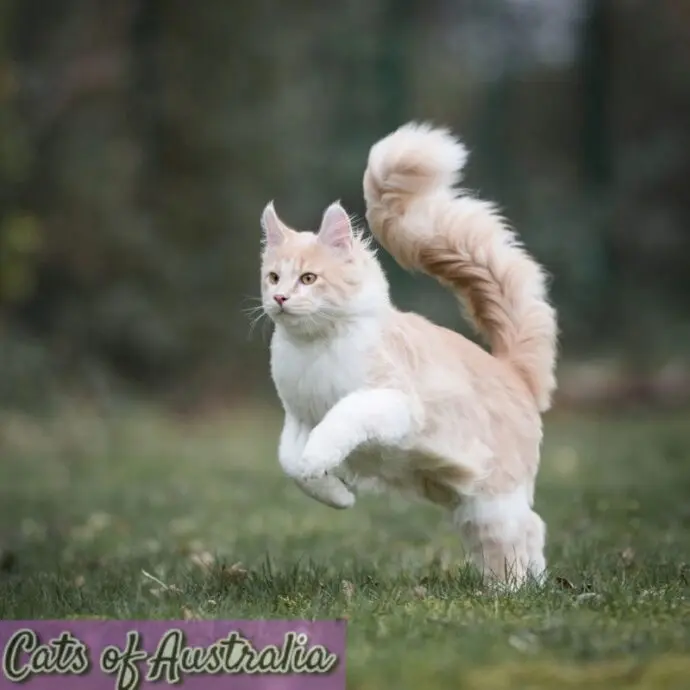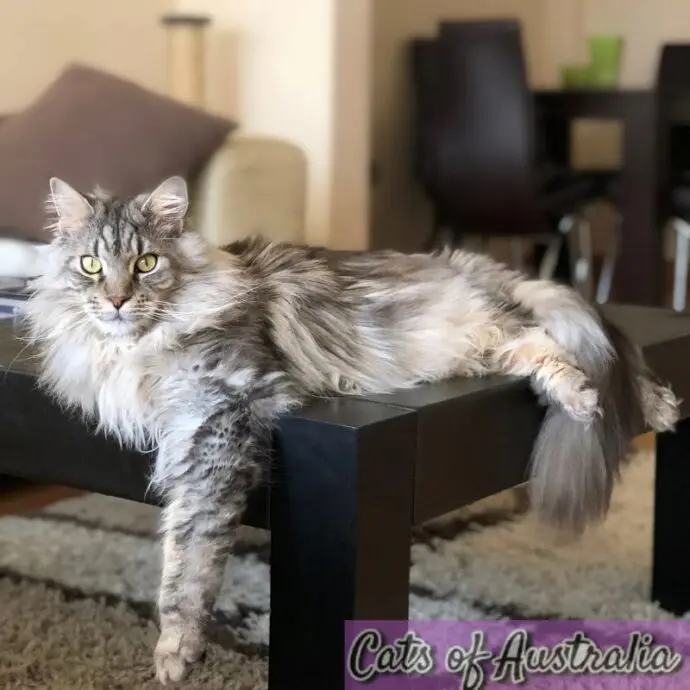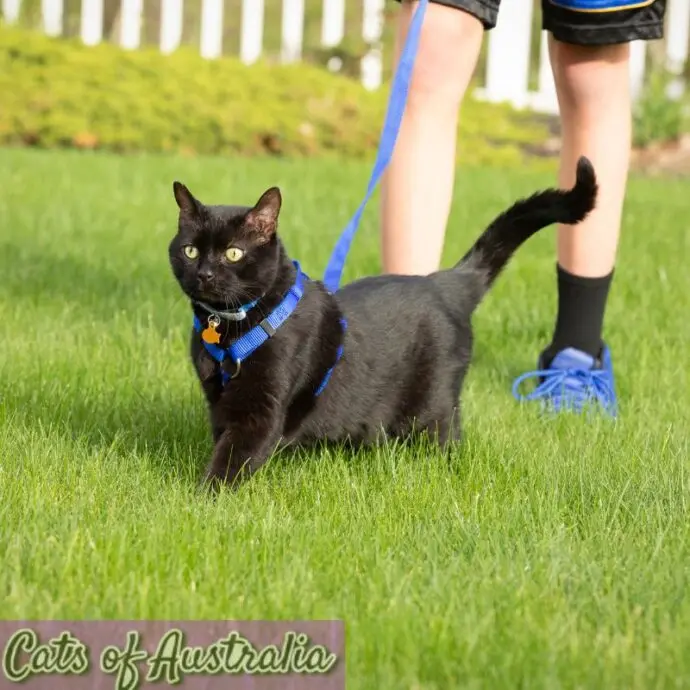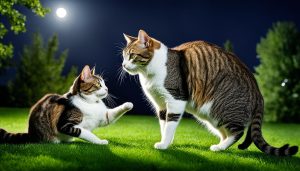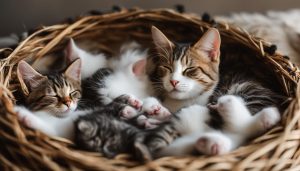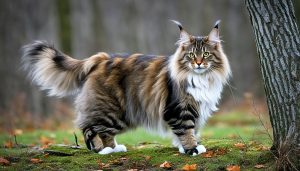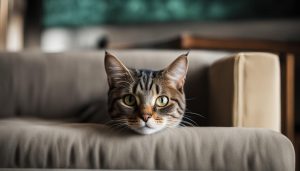Maine Coon cats are known for their gigantic size, playful personalities, love of the outdoors, and wild ancestral heritage. Hence, many potential cat owners wonder if these cats can be kept as indoor pets, especially for those who live in urban areas or have limited space for a cat to roam.
The short answer is yes, Maine Coon cats can be indoor cats as long as you give them a lot of enrichment activities. These cats are typically very social and enjoy spending time with their human family members and other pets.
Furthermore, many Maine Coon cat owners choose to keep their cats indoors for various reasons, including providing them with a safer and more controlled environment and protecting them from potential dangers such as theft, accidents, and other animals.
Maine Coon’s who live Indoor live longer, healthier lives than cats allowed to roam outside.
This blog post will provide answers to questions concerning what it takes to make an indoor living environment suitable for Maine Coon cats and address concerns such as how to keep them clean, reduce shedding, how much room they need, if you can leave them alone while you are away, and more.
Let’s delve in!
Can you keep a Maine Coon cat as a pet?
Yes, Maine Coon cats can make great pets. They are known for being friendly(with other pets), playful, and affectionate with their owners.
They also have a good temperament, known as gentle giants, so they won’t ever get on your nerves. They are a large breed of cats, with males typically weighing between 13 to 18 pounds and females typically weighing between 9 to 12 pounds.
They are also known for their intelligence and ability to learn, which makes them easy to train and a good option for families with children.
Is the Maine Coon an indoor cat or an outdoor one
The Maine Coon cat can adapt to both indoor and outdoor living environments. Having a wild ancestral heritage, many Maine Coon cats enjoy spending time outside exploring their surroundings.
However, it is possible to keep a Maine Coon cat as an indoor pet, provided that you give them enough room for play and exercise.
Make interactive toys and scratching posts available to mentally stimulate and allow them to explore and express their instincts, like hunting.
Can you keep a Maine Coon as an indoor cat?
Yes, Maine Coon can be kept as an indoor cats due to their independent nature. But these cats are known for their intelligence and curiosity, so they can often become bored if they do not have enough stimulation.
To ensure that your Maine Coon has a happy and healthy life indoors, you will need to provide plenty of enrichment activities such as scratching posts, interactive playtime, and toys.
You should also make sure to give your cat plenty of exercise by taking them for walks or allowing them to explore the outdoors safely in a cat enclosure.
With the right environment and care, you can keep your Maine Coon happy as an indoor cat!
Is it safe to keep Maine Coon Cats indoors?
It is safe to keep Maine Coon cats indoors, living happily and healthily.
However, these cats have a lot of energy and a strong desire to hunt. So it’s essential to provide them with enough room to move around and play and keep them engaged to prevent them from getting bored and destructive.
It is also important to make sure that their indoor living space is safe and comfortable for them. This includes providing them with a comfortable bed, fresh food and water, and a clean litter box.
Regular grooming is also essential, as Maine Coon cats have long hair that can mat and tangle if not appropriately groomed.
In addition, since they are a highly coveted breed, keeping them indoors can help protect them from potential dangers like catnappers who might want to use them in cat cage fights and other risks like car incidents, predators, and harsh weather.
If you’re looking for a loyal companion that will bring joy to your home, the Maine Coon Cat is worth considering!
How much room do you need to keep a Maine Coon cat as an indoor cat?
These large breeds of cats typically weigh between 13 to 18 pounds for male Maine Coon and 9 to 12 pounds for female Maine Coon, about 3 to 5 pounds more than a domestic cat on average, so they need a bit more room than the average cat.
Although, there are no hard and fast guidelines about how much space a cat needs. On average, pet owners have recommended having a minimum of 20 square feet for a Maine Coon cat, but it’s best to provide more room so your cat can stay active and thrive.
Nevertheless, these animals can survive in various environments, including small spaces, as long as you can meet their needs.
If you’re thinking about getting a Maine Coon cat as an indoor pet, and have a small space, find ways to keep your pet active with a cat tree, plenty of toys and scratching posts to keep them entertained.
With the right amount of space and attention, your Maine Coon cat will be a happy and healthy addition to your home.
Pros and cons of keeping Maine Coons as indoor cats
The Maine Coon’s have many attractive traits that make them a popular cat breed. However, there are some pros and cons you need to know for keeping Maine Coons as indoor cats.
Pros of keeping Maine Coons as indoor cats
- Safety
Indoor cats are protected from dangers such as car accidents, poisonous substances, catnappers, dogs, etc.
- Bonding:
Keeping your Maine Coon indoors allows you to spend more time with them, promoting a strong bond between you and your cat.
- Healthier life
Although an outdoor Maine Coon cat is less likely to become obese, indoor cats are less likely to contract diseases and parasites and have a reduced risk of getting into fights with other cats, which can lead to injuries.
- Longevity
Indoor cats tend to have a longer lifespan than outdoor cats.
- Predictable behaviour
Indoor cats tend to be more predictable in their behaviour, as they have a consistent environment and routine.
Cons of keeping Maine Coons as indoor cats
- Limited space
Maine Coons are a large breed and require a lot of space to move and play, so keeping them in an apartment or small space can be challenging.
- Lack of stimulation
Indoor cats may become bored if they do not have enough space or activities to keep them mentally and physically stimulated.
- Grooming needs
Maine Coon’s shedding coats require regular grooming to keep them clean and healthy.
- Litter box care
Indoor cats require litter boxes that need to be cleaned regularly.
- Potential for destructive behaviour
Without enough space or activities, indoor cats may become bored and engage in destructive behaviours such as scratching furniture or digging in potted plants.
Are Maine Coons good apartment cats?
Maine Coons are a large and friendly breed and can make good apartment cats as long as their exercise, grooming, and overall needs are met.
However, due to their large size, they may require more space than other breeds. They are known to be quite active, playful, and curious cats, who like to climb and explore, so having some vertical space for them, such as cat trees or shelves, is essential.
If you want to own a Maine Coon cat with proper care and attention, it can thrive in an apartment setting, but be prepared to give it the stimulation and space it needs to mark its territory and feel safe and unbothered throughout the day.
How to care for Maine Coons if you keep them as indoor cats?
The Maine Coon breed is beloved for its size, sociability, and affectionate personality. If you plan to keep your Maine Coon cat indoors, it’s crucial to provide proper care to keep them healthy and happy.
Let’s look at how you can care for your indoor Maine Coon cat.
How to exercise indoor cats?
Exercising indoor cats is an opportunity to engage them in their natural behaviours, which is vital for their overall health and well-being.
That said, here are some ways to provide your indoor cat with the exercise and stimulation they need:
- Playtime
Set aside time for interactive play with your cat each day using toys such as laser pointers, feather wands, or balls. This will help them to burn off energy and keep them physically active.
- Scratching Posts and Climbing Structures
Provide your cat with plenty of scratching posts and climbing structures, such as cat trees, shelves, or window perches. This will give them opportunities to climb, jump, and scratch, which is all-natural behaviour for cats.
- Hide-and-Seek
Hide toys or treats around your home for your cat to find. This can give them mental stimulation and a sense of accomplishment as they seek their rewards.
- Puzzle feeders
Using puzzle feeders that require your cat to work for their food can be a great way to stimulate them mentally, and it’s a fun way to slow down their eating.
- Provide variety
Rotate your cat’s toys regularly. This will keep them from becoming bored and ensure they have something new to play with daily.
- Give them a window view.
Cats love to watch birds and other wildlife. Giving them window views can be a great way to provide them with mental stimulation.
Do you have to walk your indoor cat?
According to Molly DeVoss, a certified feline training and behaviour specialist and founder of the nonprofit Cat behaviour Solutions, the mental benefits cats receive from daily exercise are even more significant than physical exertion.
Cats have a high metabolism that even burns calories as they are loafing around, so they do not have the same exercise needs as dogs but need a daily activity for their well-being.
Cats do not require walks as a part of their daily routine and can get all the exercise and stimulation they need through play and climbing inside your home.
However, for some cats, walking can be a fun and exciting experience, and some cats, like the Maine Coon can be leash trained to walk with their owners.
Not all cats will enjoy or tolerate being walked on a leash, and it may take some training and patience to get them comfortable with it.
In general, indoor cats need a variety of activities to keep them physically and mentally stimulated. Some ways to provide them with exercise and stimulation have been mentioned above.
By providing your indoor cat with a stimulating environment, plenty of toys, and interactive playtime, they should be able to stay healthy and happy without needing to be walked.
How to keep indoor cats clean?
There are several ways to keep indoor Maine Coon cats clean:
- Regular grooming
Brush your cat’s fur regularly to remove loose hair and dirt.
- Provide a clean litter box
- Maine Coon cats dislike dirty litter boxes and will not use them if they aren’t clean. To ensure that your Maine Coon is happy and using the litter box, ensure that their litter box is always clean.
- Bathing
Maine Coon cats do not need frequent baths since they typically clean themselves, but you can bathe them once a month to help remove any dirt or debris that may have accumulated in their coat.
- Nail trimming
Keep your cat’s nails trimmed to prevent them from getting caught on things or snagging their fur.
- Regular veterinary checkups
Routine checkups with your vet can help keep your cat clean and healthy, and any health issues can be addressed quickly.
It’s also essential to keep your house clean, providing clean bedding and food and water bowls, you can help minimize the amount of dirt and debris that can accumulate in your cat’s coat.
How to reduce shedding?
There are several things you can do to reduce shedding in Maine Coon cats:
- Brush your cat regularly
Regularly brushing your cat’s fur can help remove loose hair and dirt, reducing the amount of shedding.
- Provide a healthy diet
A well-balanced diet with enough protein can help keep your cat’s coat healthy and reduce shedding.
- Regular grooming
Regular grooming can also help reduce shedding by keeping your cat’s coat and skin healthy.It’s also a great way to bond with your cat and distribute oils throughout their coat, keeping it shiny and healthy.
- Consider additional supplements
Some pet supplements like omega-3 or omega-6 fatty acids can help support a healthy coat and reduce shedding.
Consult with your vet before giving any supplement.
- Address underlying health issues
If your cat is shedding excessively, it may be a sign of an underlying health issue.
Consult your vet to rule out any health issues that may cause excessive shedding.
It’s important to note that Maine Coon cats are known to shed a moderate to heavy amount year-round, so it’s possible for them to shed more than other cat breeds. Still, by taking these steps to maintain their overall health and grooming, you can help reduce shedding as much as possible.
Can you leave a Maine Coon cat alone?
Maine Coon cats can be left alone for short periods, but it’s not ideal to leave them alone for extended periods regularly. These cats are known for being friendly and affectionate with their human family and enjoy companionship.
If you have to leave your Maine Coon cat alone for a more extended time, for example, for a workday, it’s essential to prepare for their needs.
- Make sure they have food, water, and a clean litter box available.
- Provide them with cat toys or interactive feeders to keep them mentally stimulated.
- Additionally, consider hiring a pet sitter or using technology such as a pet camera to check in on them to ensure they are comfortable and safe.
- It’s also a good idea to arrange for someone to check on your Maine Coon, even if it’s just a quick drop-in, once a day or so.
Remember that, like all cats, Maine Coon cats are independent and will do fine without constant attention and company, but they still need proper care and attention.
How can Maine Coons experience the outdoors with their owners?
For Maine Coon owners that want their cats to experience the outdoors, there are several ways to take them outside while keeping a close watch.
- Leash training
Some cats can be trained to walk on a leash and harness, allowing you to take them for walks outside. This can be an excellent way for your Maine Coon to experience the outdoors while still being safe and under your supervision.
- Outdoor enclosures
You can build or buy an outdoor enclosure that allows your cat to safely experience the outdoors while still being protected from other animals and potential hazards.
- Catio
A Catio is a patio for cats that allows your cat to enjoy the fresh air and watch birds and insects while still being safely contained.
Takeaway – Making indoor living a purr-fect experience for your Maine Coon Cat.
Maine Coon cats can make great indoor cats, but due to their large size and high energy levels, they require a bit more space and attention than smaller breeds.
They are known for their warm and sociable personalities, which makes them great companions for people who spend a lot of time at home. However, it’s crucial to take note of the following:
Provide them with plenty of opportunities for climbing, scratching, and playing to keep them physically and mentally stimulated.
Regular grooming is vital to keep their shedding coat under control and maintain their overall health.
Indoor living also provides a safe environment for them, reducing the risk of injury, disease and other dangers.
With proper care and attention, Maine Coon cats can thrive as indoor cats, living a happy and healthy life with their human family.
Are you looking for Maine Coon cats for sale but unsure where to find the right one? Look no further, we have a list of the best breeders in Australia.
Check our list of registered breeders!


